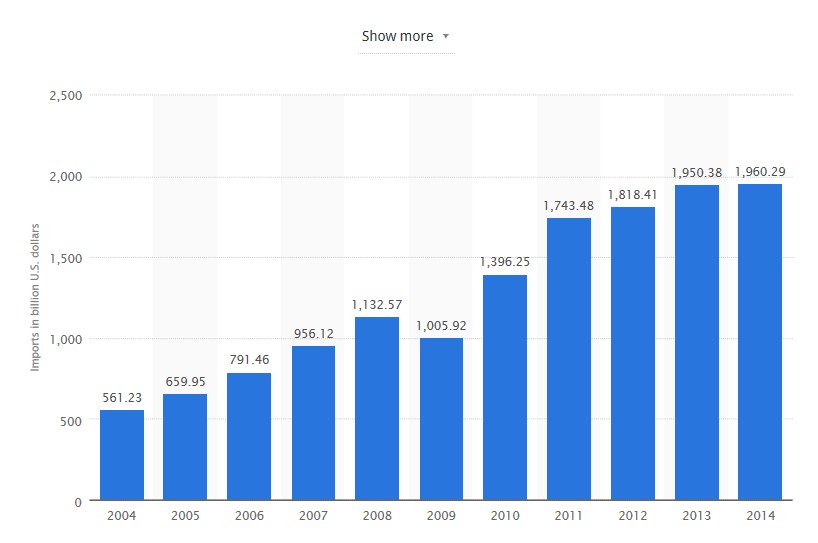
Because the Chinese middle class continues to grow and buy, Chinese markets are highly attractive for imports, if you have a global forwarding provider who knows how to deliver.
With 1.35 billion people, China is the world’s most populous country. According to the International Monetary Fund, China’s 2016 GDP reached $11.2 trillion (USD), making it the world’s second largest economy; GDP is expected to reach $15 trillion (USD) by 2019.
China is also the second largest importer of goods globally, largely due to the fast-growing consumer and automotive market. Between 2004 and 2014, China imported $13.52 trillion (USD) in goods. Most imports come from Europe, Association of Southeast Asian Nations (ASEAN), South Korea, Japan, and United States, respectively, based on import value.

Logistics companies in China are not created equal
Requirements for importing goods to China are stringent, and not all logistics providers have the capabilities to ship where your products are going. There are nearly 10,000 logistics companies in China, including thousands of small logistics companies. Each claims they can do any job in China because they have connections with brokers and transportation providers. Many of them say they can provide personalized job service, if you require it.
However, this may not be the case. Smaller logistics companies typically do not own any office, facility, system, or equipment in China. Most rely on an agency network relationship to move the freight to China only. In fact, it is fairly common to find that more than two or three different logistics parties are actually moving the goods into China, especially in the Tier Two and Tier Three cities.
To choose suitable freight forwarding companies in China, be sure they have these 5 capabilities:
- Deep knowledge about the import/export procedure
- Standardized and consistent processes worldwide
- Standardized compliance practices worldwide
- System visibility, and the ability to track and trace shipments
- Proficiency with International commerce terms of sale (Incoterms® 2010)
While larger, professional global freight forwarders should have these capabilities, it does not mean their logistics services will be more expensive. Global companies can often negotiate more favorable rates with carriers or airlines because they have more volume. In addition, process standardization and visibility can add efficiency to the supply chain, which can also reduce costs.
What you need to know about Global Forwarding in China
Many end buyers in China expect to be able to import goods with “One Click.” They do not consider that there are shipping documents, regulations, procedures, and regulatory compliance requirements to complete at origin. They can process a shipment smoothly to move from North America to China by having their global freight company file the Shipping Letter of Instruction (SLI), AES Filing, Power of Attorney (POA), or Foreign Principal In Interest (FPPI) to comply with U.S. regulations.
Managing a distribution network within China
There is a huge market to sell goods inside of China. But in addition to the import regulations, Chinese distribution channels are more complex than those in the United States or Europe. Import goods are classified as Permitted, Restricted, or Prohibited. Distribution models in China include concentrated wholesale markets, business to consumer service (B2C), online distribution channel, and more.
Mobile is gaining quickly on other methods of sale. For example, China’s Singles Day, the November 11 festival that celebrates the singles’ life, has become the biggest volume shipping day in the world. The largest ecommerce company in China, Alibaba Group, sold more than $9 billion in volume within 24 hours in 2014.
Online and offline integration (O2O) is a new business model that combines online shopping with the front line transaction. O2O is particularly suitable for the consumer goods, services, and retail industries. The O2O platform not only holds the traditional online business (details of personalized information and payment process), but also develops the unique value of logistics and business flow offline. Additional O2O experience, payment techniques (online and offline), and mobile security will be required in the near future to make this model completely viable.
How to choose a global forwarding company for China markets
When deciding on a global forwarding services provider for China, make sure it has these five qualities:
- Deep knowledge about the import/export procedure – Your global forwarding provider needs to be well versed in the importing and exporting procedures specific to China to be able to properly support your needs.
- Worldwide reach – An ideal provider has international experience, access to local shipping experts in various territories, and is able to communicate globally without language barriers.
- Standardized compliance practices worldwide – Your global forwarding provider should be familiar with regulations like sanctions, export controls, and trade laws to mitigate any legislative risk.
- System visibility, and the ability to track and trace shipments – The provider you consider should have the technology to be able to track and trace international shipments, such as a TMS platform. This is essential for remaining on top of your shipments and handling any problems that may arise.
- Proficiency with International commerce terms of sale – Your global forwarding provider should be familiar with the Incotermsâ Rules 2010 in order to ensure compliance.
While larger, professional global freight forwarders should have these capabilities, it does not mean their logistics services will be more expensive. Global companies can often negotiate more favorable rates with carriers or airlines because they have more volume. In addition, process standardization and visibility can add efficiency to the supply chain, which can also reduce costs.
How to get the most out of your Global Forwarding efforts in China
Most companies meet monthly, quarterly, or annually with their global forwarding providers. Together, they review numbers of shipments, chargeable weight, and thousands of TEUS moved. To reveal is how much efficiency, productivity, and cost savings they have added to your company, ask for:
Key Performance Indicators (KPIs)
It is important to make sure the key performance indicators (KPIs) align with your corporate goals. KPIs identify the areas that matter most to you, and help you measure your progress. Response time to accepting shipment tenders and on time deliveries are examples of KPIs.
Request for Proposal (RFP), Request for Quotation (RFQ), or Invitation for Bid (IFB)
These standard business documents invite service providers to bid on specific services for your business. Even if you are not interested in changing your current provider, issuing an RFP, RFQ, or IFB provides the opportunity to explore the service and rate in depth and determine where improvements can be made.
Final Thoughts
There is a lot to be gained if you can successfully move goods into, out of, and around China. Your organization can see tremendous financial growth, while also establishing a global profile. Since Chinese shipping regulations and processes differ from any other market in the world, it is risky to attempt to navigate these waters on your own.
Hiring a global forwarding provider— and choosing the best one to fit your organization— can make or break your venture into Chinese markets. Don’t leave your success in China up to chance. Take advantage of the benefits an optimal global forwarding provider partner offers.
Shipping into, out of, and within China in complex and can be nearly impossible to get right on your own. Learn more about global forwarding services that can simplify the process for you, giving you access to lucrative Chinese markets.



